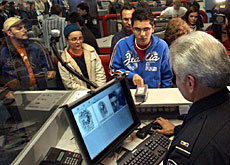US seeks to calm fears over stricter border checks

The United States has sought to allay Swiss fears that tightened border security checks could lead to the misuse of sensitive personal information.
Officials said the collection and storage of biometric data – including fingerprints and digital photographs – would be rigorously protected.
Washington’s decision to introduce stricter entry procedures for visitors has drawn criticism from Swiss politicians and data protection officials.
The new rules are due to come into force in October 2005 and will apply to citizens from 27 countries who are currently permitted to travel to the US without visas for up 90 days.
Secure data
Steven Yonkers, a US official in charge of privacy issues relating to the new regulations, told swissinfo that passenger data would not be released to third parties.
“We’ve carried out an extensive assessment of our security systems and [have imposed] very strict guidelines about what can be done with the data,” said Yonkers during a video conference at the US embassy in the Swiss capital, Bern.
“We will use the data to create a complete travel history of visitors. [That way] we’ll be able to start a programme for regular travellers, so they can travel more easily and rapidly to the US,” he added.
But he also confirmed that the data could be stored securely for up to 100 years and accessed by US government offices.
Washington announced plans to impose the security procedures after it became clear that most of the so-called “visa-waiver countries” would not meet an October deadline to have biometric passports in place.
These passports will include face recognition and possibly iris or fingerprint identification features that will make the documents virtually impossible to counterfeit.
Deterring terrorists
The new measures are partly designed to deter terrorists from taking advantage of the easier entry restrictions in place for some countries.
But the regulations have been criticised by some Swiss parliamentarians, who argue that future visitors to the US can expect to be treated like criminals.
Switzerland’s data protection commission has also expressed concern that the information held by the US authorities could be misused.
But Robert Mocny, deputy director of the US Visitor and Immigrant Status Indicator Technology (US-VISIT) office, said it was not up to foreign countries to become involved in discussions on how the new procedures would work.
“The Swiss have no say in the decision-making process. It is a completely US government process,” Mocny said.
More arrests
Short-term tourists from countries which are not part of the US “visa-waiver” programme have been subjected to the stricter checks since the start of the year.
Mocny says the new regulations have already led to more arrests of suspected criminals within the US.
“Around 300 individuals have been arrested at ports of entry since the new programme was introduced. The vast majority of them… would not have been caught without the biometric test.”
Fingerprinting and photographing visitors to the US is not entirely new to Switzerland.
Swiss citizens applying for visas, which are required for stays of three months or more, have been undergoing the procedure at the US embassy since the beginning of March.
swissinfo, Vanessa Mock
The new rules are due to come into force in October 2005.
Passenger data will not be released to third parties.
The data will be kept for up to 100 years for use by US government agencies.

In compliance with the JTI standards
More: SWI swissinfo.ch certified by the Journalism Trust Initiative









You can find an overview of ongoing debates with our journalists here . Please join us!
If you want to start a conversation about a topic raised in this article or want to report factual errors, email us at english@swissinfo.ch.